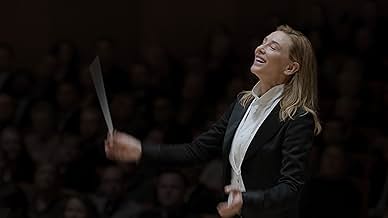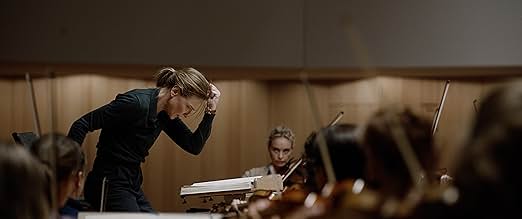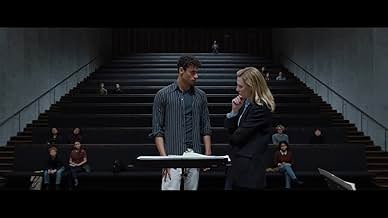Tár
- 2022
- Tous publics
- 2h 38m
Set in the international world of Western classical music, the film centers on Lydia Tár, widely considered one of the greatest living composer-conductors and the very first female director ... Read allSet in the international world of Western classical music, the film centers on Lydia Tár, widely considered one of the greatest living composer-conductors and the very first female director of a major German orchestra.Set in the international world of Western classical music, the film centers on Lydia Tár, widely considered one of the greatest living composer-conductors and the very first female director of a major German orchestra.
- Nominated for 6 Oscars
- 79 wins & 271 nominations total
Zethphan D. Smith-Gneist
- Max
- (as Zethphan Smith-Gneist)
Alec Baldwin
- Alec Baldwin
- (voice)
- Director
- Writer
- All cast & crew
- Production, box office & more at IMDbPro
Featured reviews
It is not surprising that this film is tanking at the box office since it is much too long and slow paced for the average movie goer's attention span. Indeed parts of it, like the agonizingly protracted opening scene where a New Yorker magazine music critic interviews the title character about her classical music esthetics, seem designed by writer/director Tod Field as a boredom experiment wherein if you can survive it without running and screaming into the night out of sheer and utter ennui then you are worthy to see the rest of his "masterpiece".
Thing is, though, that a lot of this film does approach, if not encroach upon, masterpiece territory. Certain scenes, like Lydia Tar's bleak Staten Island homecoming where she summons the spirit of her mentor Leonard Bernstein in an effort to recapture the humanistic values she has lost, are genuinely heartbreaking. And the sequences that deal with Lydia's manipulation of her acolytes are difficult to watch as we see how artistic power feels even more corruptible, somehow, than the political kind, perhaps because it is a profanation of a purer space.
And I think we can all agree that Cate Blanchett is one helluva fine actor! As are Nina Hoss, Noemie Merlant and Sophie Kauer who play various of her entourage/victims.
Bottom line: For all its faults I have a sneaking suspicion that in twenty years they'll be watching this and not "The Fabelmans". Give it a B plus.
Thing is, though, that a lot of this film does approach, if not encroach upon, masterpiece territory. Certain scenes, like Lydia Tar's bleak Staten Island homecoming where she summons the spirit of her mentor Leonard Bernstein in an effort to recapture the humanistic values she has lost, are genuinely heartbreaking. And the sequences that deal with Lydia's manipulation of her acolytes are difficult to watch as we see how artistic power feels even more corruptible, somehow, than the political kind, perhaps because it is a profanation of a purer space.
And I think we can all agree that Cate Blanchett is one helluva fine actor! As are Nina Hoss, Noemie Merlant and Sophie Kauer who play various of her entourage/victims.
Bottom line: For all its faults I have a sneaking suspicion that in twenty years they'll be watching this and not "The Fabelmans". Give it a B plus.
During the first minute of this film, Cate Blanchett shows what an extraordinary actress she is. Her character, star conductor Lydia Tár, is waiting to go onstage. There is no dialogue, only body language. But even without words, Blanchett shows what Tár thinks and feels.
Blanchett's remarkable performance is a large part of what makes this a good movie. But there's more. The very clever script gives us a lot to chew on afterards. Tár is a woman in the men-dominated world of classical music. She's not warm, empathic or even very sympathetic. In fact, she has many characteristics that are usually associated with men. She's vain, selfish and manipulative. And that's what gets her in trouble. At the start of the film, she seems to be one of the most admired women in the world. She is extremely famous and successful. At the end, everything has fallen apart.
The film doesn't judge. It leaves it up to the viewer to decide if Lydia Tár is a victim or a culprit. Or maybe both at the same time. The viewer gets a lot of information to make up his (or her) mind. Director Todd Field gives us the story elements slowly, bit by bit. Take the scene where Lydia Tár gives a stern speech to a young girl who bullies her daughter. It shows that she is used to getting everyone in line, according to her wishes. That's useful information to interpret things later on in the movie.
Tár is very much a modern movie. It has things to say about gender, about power, about social media, about being woke. But at the same time, it's a very old-fashioned movie. It takes its time. There are long scenes, and long takes. There's nothing modern in the way it is filmed. And that's a good thing.
Blanchett's remarkable performance is a large part of what makes this a good movie. But there's more. The very clever script gives us a lot to chew on afterards. Tár is a woman in the men-dominated world of classical music. She's not warm, empathic or even very sympathetic. In fact, she has many characteristics that are usually associated with men. She's vain, selfish and manipulative. And that's what gets her in trouble. At the start of the film, she seems to be one of the most admired women in the world. She is extremely famous and successful. At the end, everything has fallen apart.
The film doesn't judge. It leaves it up to the viewer to decide if Lydia Tár is a victim or a culprit. Or maybe both at the same time. The viewer gets a lot of information to make up his (or her) mind. Director Todd Field gives us the story elements slowly, bit by bit. Take the scene where Lydia Tár gives a stern speech to a young girl who bullies her daughter. It shows that she is used to getting everyone in line, according to her wishes. That's useful information to interpret things later on in the movie.
Tár is very much a modern movie. It has things to say about gender, about power, about social media, about being woke. But at the same time, it's a very old-fashioned movie. It takes its time. There are long scenes, and long takes. There's nothing modern in the way it is filmed. And that's a good thing.
How much you enjoy Tar will depend largely on how you feel about a film that begins with the credits. There's good reason for it (everything in Tar is considered down to the smallest detail) but if you can't get on board with that kind of self indulgence then you are in for a long two and a half hours.
One of the reasons for beginning with the credits may be that we are about witness a career in reverse. An opening interview lets us know that Lydia Tar is at the top of her profession, a conductor with a dream resume and an EGOT who is about to complete her masterpiece symphony recording. Over the next couple of hours we see her slipping down the mountain as past deeds and the way she treats people in general come back to take a bite out of her perfect life.
The film solely follows Kate Blanchett's Tar for the entire runtime, we see all events from her perspective and she is in every scene. Blanchett put its an astounding performance, indeed it is hard to imagine many, if any, other actors who could have been up to the task. That the whole show rests on such a powerful but subtle turn is Tar's greatest strength but also its only real weakness. Its a nuanced performance that fits perfectly but added to the characters flawed nature it can at times leave proceedings feeling cold and hard to connect with emotionally. Like its titular character Tar is a film of craftmanship and intellect not emotion, although the themes of hierarchy dynamics and abuse are powerful.
If you can get on board with the full force filmaking style then you will find Tar a breathtaking wonder of a movie with something to think about in every scene and something to ponder long after the (second lot of) credits roll.
9 successful recordings out of 10 symphonies.
One of the reasons for beginning with the credits may be that we are about witness a career in reverse. An opening interview lets us know that Lydia Tar is at the top of her profession, a conductor with a dream resume and an EGOT who is about to complete her masterpiece symphony recording. Over the next couple of hours we see her slipping down the mountain as past deeds and the way she treats people in general come back to take a bite out of her perfect life.
The film solely follows Kate Blanchett's Tar for the entire runtime, we see all events from her perspective and she is in every scene. Blanchett put its an astounding performance, indeed it is hard to imagine many, if any, other actors who could have been up to the task. That the whole show rests on such a powerful but subtle turn is Tar's greatest strength but also its only real weakness. Its a nuanced performance that fits perfectly but added to the characters flawed nature it can at times leave proceedings feeling cold and hard to connect with emotionally. Like its titular character Tar is a film of craftmanship and intellect not emotion, although the themes of hierarchy dynamics and abuse are powerful.
If you can get on board with the full force filmaking style then you will find Tar a breathtaking wonder of a movie with something to think about in every scene and something to ponder long after the (second lot of) credits roll.
9 successful recordings out of 10 symphonies.
Everybody writing about this mock biopic focuses on Cate Blanchett's knock-it-out-of-the-park performance, but when compared to Field's "Little Children" (2006), "Tár" lacks the storytelling and editing skills which make the earlier film a masterpiece of human relations, whereas the latter is an interesting character study that somehow collapses under its own weight.
There's a strong establishing scene showing Tár demolishing an aspiring musician's conceited views on Bach, yet one has to wait for a long time for a follow-up showing the main character's boundary issues. The central topic emerges rather quickly (abuse of power), but there are diversions which support character development, yet drag on the narrative, which is probably why many reviews here find the film frustrating.
Being an ex-Berliner, I like the fact that the city is being used as a real location as opposed to the usual tourist / Cold War hot spots, and the Philharmonics rehearsal scenes are very well done, but they don't really push the story forward and could have easily been wound down a bit.
Nina Hoss as Tár's partner is a brilliant counterpoint, because she keeps a good deal of her thoughts to herself until she doesn't, so more focus on their relationship would have helped the story. Hoss would deserve a supporting actress Academy Award nod if only she had more screen time.
The initial scene of conflict eventually loops back into focus, and Field could have used this to explore societal misjudgment as he did in "Little Children" - but he doesn't, which makes "Tár" rather distant and cold. Field expects viewers to interpret a lot on their own, which is bold and demanding, but with this approach it is crucial to keep focus on an underlying message, otherwise it gets lost.
In conclusion, "Tár" has all the ingredients for a masterpiece - interesting characters, great performances, nice camerawork - but weak storytelling ultimately reduces the film's potential.
There's a strong establishing scene showing Tár demolishing an aspiring musician's conceited views on Bach, yet one has to wait for a long time for a follow-up showing the main character's boundary issues. The central topic emerges rather quickly (abuse of power), but there are diversions which support character development, yet drag on the narrative, which is probably why many reviews here find the film frustrating.
Being an ex-Berliner, I like the fact that the city is being used as a real location as opposed to the usual tourist / Cold War hot spots, and the Philharmonics rehearsal scenes are very well done, but they don't really push the story forward and could have easily been wound down a bit.
Nina Hoss as Tár's partner is a brilliant counterpoint, because she keeps a good deal of her thoughts to herself until she doesn't, so more focus on their relationship would have helped the story. Hoss would deserve a supporting actress Academy Award nod if only she had more screen time.
The initial scene of conflict eventually loops back into focus, and Field could have used this to explore societal misjudgment as he did in "Little Children" - but he doesn't, which makes "Tár" rather distant and cold. Field expects viewers to interpret a lot on their own, which is bold and demanding, but with this approach it is crucial to keep focus on an underlying message, otherwise it gets lost.
In conclusion, "Tár" has all the ingredients for a masterpiece - interesting characters, great performances, nice camerawork - but weak storytelling ultimately reduces the film's potential.
Don't be fooled by the great reviews, if you're someone who's not particularly interested in orchestras, conductors and random old musicians from times past, this movie is an utter bore. The first 10 minutes are CREDITS. JUST CREDITS. Then it drags on with the most absolutely annoying, long, mind-numbing scenes where rich, white people just talk to each other about the most esoteric stuff, with cameos of the actress talking to her orchestra about which string needs to be pulled in which direction.
I'm dead serious, 1 and a half hour later, you still can't tell what the hell's going on. It's just scenes of her talking about the most mundane stuff, and playing instruments.
It's a pretentious movie, that appears completely different and way more interesting in the trailer, but in reality is just an elitist blob of nothingness aesthetic. If you value your money and time, don't watch this movie.
I'm dead serious, 1 and a half hour later, you still can't tell what the hell's going on. It's just scenes of her talking about the most mundane stuff, and playing instruments.
It's a pretentious movie, that appears completely different and way more interesting in the trailer, but in reality is just an elitist blob of nothingness aesthetic. If you value your money and time, don't watch this movie.
Did you know
- TriviaProfessional cellist Sophie Kauer had no prior acting experience and auditioned at the encouragement of a friend. She learned to act by watching YouTube tutorials hosted by Michael Caine.
- GoofsWhen Lydia is talking to the two technicians after a rehearsal in Berlin, she requests they send her audio and video recordings, but the console in front of them in the booth is actually for controlling lights, not audio/video.
- Crazy creditsThe opening credits presents the film crew and acknowledgments (usually shown at the end titles) without presenting the actors. The actors and soundtrack are shown at the ending without the crew.
- ConnectionsEdited from Le Projet Blair Witch (1999)
- SoundtracksDas Wohltemperierte Klavier: Präludium and Fuge C-Dur, BWV 846
Written by Johann Sebastian Bach
Piano, Cate Blanchett
- How long is Tár?Powered by Alexa
Details
- Release date
- Country of origin
- Official sites
- Languages
- Also known as
- Tar
- Filming locations
- Dresden, Saxony, Germany(Kulturpalast & Großen Garten Platz)
- Production companies
- See more company credits at IMDbPro
Box office
- Budget
- $25,000,000 (estimated)
- Gross US & Canada
- $6,773,650
- Opening weekend US & Canada
- $158,620
- Oct 9, 2022
- Gross worldwide
- $29,177,163
- Runtime
- 2h 38m(158 min)
- Color
- Sound mix
- Aspect ratio
- 2.39 : 1
Contribute to this page
Suggest an edit or add missing content























